Call for Applications: Germany Research Visits (2025)
The Merian Centre for Advanced Studies in the Maghreb (MECAM) invites applications for three grants within its ” Germany Research Visits ”, which allows for, which allows for maximum three-month stays at one of its German partner institutions (Philipps-Universität Marburg, GIGA Institute for Middle East Studies in Hamburg, Forum Transregionale Studien in Berlin, Leipzig University). The call allows stays throughout the entire year 2025. Only applications submitted in English will be considered.
MECAM has been founded by a consortium of Tunisian and German research institutions to promote free academic exchange and cooperation in the Humanities and Social Sciences in and across the Maghreb and other regions of the world. Its five interrelated ‘Interdisciplinary Research Fields’ (IRFs) – “Aesthetics & Cultural Practice”, “Inequality & Mobility”, “Memory & Justice”, “Resources & Sustainability”, and “Identities & Beliefs” – represent MECAM´s guiding theme “Imagining Futures: Dealing with Disparity” (more information on this can be found on) [ http://www.mecam.tn ].
While the regular MECAM fellowships offer scholars free space to work on their self-chosen research projects within a community of fellows at MECAM and in exchange with colleagues in Tunis, the Germany Research Visits programme offer opportunities for exchange with scholars from the institutions or networks of MECAM’s partners in Germany.
Deadline: 30. September 2024, 24.00h CET.
ELIGIBILITY & MOTIVATION
- Applications are welcome if:
- you have already been a MECAM Fellow or are appointed Principal Investigator
- you present a project that is related to MECAM’s guiding theme at least one of its IRFs
- you can provide valuable academic contributions for the fellows and colleagues currently working at MECAM
- you are interested in collaborating and engaging with Philipps-Universität Marburg, GIGA Institute for Middle East Studies in Hamburg, Forum Transregionale Studien in Berlin or Leipzig University
- you are motivated to expand MECAM’s network
- you are prepared to enhance the visibility of MECAM at your host institution in Germany
- you are interested in contributing to academic exchange between the Maghreb and Germany
OUR OFFER
GRANT
The grant covers daily allowances as well as expenses for visa, travel and accommodation in accordance with the upper limits of the German Travel Expenses Act. During the period of their residency, which will last a maximum of three months, recipients will work at one of our German partner institutions and stay where their host institution is located. They are expected to work on the research projects or engage in the activities stated in their applications, to participate in scientific events and to present their work at least once at their host institution.
NETWORK
The primary aim of MECAM is to create a high-quality and flexible setting for peer-to-peer exchange and debate between researchers from different countries, disciplines, and in different phases of their academic career. Accordingly, guests will benefit from exchange, debate, collaboration and support of their colleagues – for example with regard to research, publications or scholarly events.The primary aim of MECAM is to create a high-quality and flexible setting for peer-to-peer exchange and debate between researchers from different countries, disciplines, and in different phases of their academic career. Accordingly, guests will benefit from exchange, debate, collaboration and support of their colleagues – for example with regard to research, publications or scholarly events.
INFRASTRUCTURE
The host institution provides its guests with office workspaces as well as communication and publication facilities for open-access and peer-reviewed formats of publication through the infrastructures of MECAM and its partners. During their entire stay, guests are supported by the MECAM staff based in Marburg in logistical and organizational matters.
YOUR APPLICATION
MECAM kindly requests that applications are submitted in English. Submissions are possible until September 30, 2024. Please send your application, which should include the documents listed below, to mecam-office@uni-marburg.de. If you have any questions, please do not hesitate to contact MECAM’s coordination office via the same email address.
|
APPLICATION DOCUMENTS:
|
The main selection criteria are the fit between the profiles / projects of the applicants and MECAM´s research agenda, academic merit, thematic and regional expertise as well as linguistic proficiency: Applicants are expected to have sufficient knowledge of English.
INSTITUTIONAL FRAMEWORK – WHAT IS MECAM?
The “Merian Centre for Advanced Studies in the Maghreb” (MECAM) was founded as an international centre for interdisciplinary research and academic exchange. It is located at the Université de Tunis/Tunisia. MECAM is a joint endeavour of a consortium of renowned Tunisian and German research institutions: It is coordinated by the Philipps-Universität Marburg and the Université de Tunis and supported by the Universität Leipzig, the German Institute for Global and Area Studies (GIGA) in Hamburg/Germany, the Forum Transregionale Studien in Berlin/Germany and the University of Sfax/Tunisia. During a three-year preliminary phase (2020-2023), this consortium is entrusted with the institutional development of MECAM and the preparation of the project’s main phase (2023-2029).
MECAM’s partner institutions:
- Philipps-Universität Marburg, Marburg: Philipps-Universität Marburg, Marburg: The Philipps-Universität Marburg, with its 25,000 students, has a research focus on the Area Studies, which is reflected for instance in the Center for Near and Middle Eastern Studies (CNMS). The CNMS is involved in MECAM, alongside other interdisciplinary institutions and departments, including the Centre for Conflict Studies, the Department of History and Cultural Studies, the Institutes of Media Studies and Romance Philology, and the Department of Mathematics and Computer Science.
- Université de Tunis, Tunis: The Université de Tunis was founded in 1960 and is today, with some 20,000 students, one of the largest universities in Tunisia, boasting a wide-ranging research and teaching portfolio with an outstanding reputation for research excellence across the region.
- Universität Leipzig, Leipzig: The Universität Leipzig is a German university with around 30.000 students. Within the MECAM institutional structure the University is represented by the Institute of Geography, the Institute for Oriental Studies, and the Small Enterprise Training Program (SEPT). The Institute of Geography’s regional focus is the Mediterranean region.
- German Institute for Global and Area Studies (GIGA), Hamburg: GIGA is an independent research institute based in Hamburg, Germany, which conducts research on politics, economics, and society in Africa, Asia, Latin America, and the Middle East as well as on global issues. Within MECAM, the GIGA Institute for Middle East Studies (IMES) is particularly involved.
- Forum Transregionale Studien, Berlin: The Forum Transregionale Studien is a platform that promotes the internationalization of research in the humanities and social sciences. It enables collaboration among researchers with different disciplinary backgrounds and awards fellowships to researchers from all over the world.
- Université de Sfax, Sfax: The Université de Sfax is located in Tunisia’s second largest city and important economic centre in the south of the country. It is attended by 35,000 students.
The Federal Ministry of Education and Research of Germany supports and funds the establishment of the international centre for research in the Humanities and Social Sciences.
The Université de Tunis provides the infrastructure for the installation of MECAM in Tunis, including the premises and complementary resources, within the Institut Supérieur des Etudes Appliquées en Humanités (ISEAHT) de Tunis.
The Merian Centre for Advanced Studies in the Maghreb (MECAM), based in Tunis, is a new institutional framework for interdisciplinary, interregional, and intergenerational research. As a centre for Advanced Study, it is dedicated to free academic exchange with a focus the social and political processes and issues that divide and connect the Maghreb, the Middle East and Europe historically and in our time – e.g. beliefs, distribution of resources, migration, rule of law, socio-economic conflicts, and (transitional) justice. MECAM aims to construct and strengthen scholarly networks between Tunisia and Germany, across the Maghreb, the Middle East, Europe, and other regions of the world. From a vantage point in the Maghreb, MECAM’s guiding theme “Imagining Futures: Dealing with Disparity” addresses the complex processes of (re-) negotiating societal experiences into ideas for the future (‘imagining futures’) within the context of different forms and scales of disparity and unequal conditions (‘disparity’). It explores the connection between multidimensional disparity and the possibilities of building and negotiating futures through five thematic interdisciplinary research fields (IRFs): “Aesthetics & Cultural Practice”, “Inequality & Mobility”, “Memory & Justice”, “Resources & Sustainability”, and “Identities & Beliefs”.
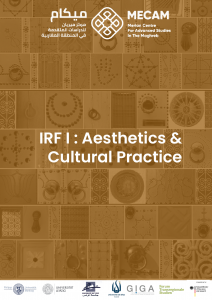
IRF « Aesthetics & Cultural Practices »
Examines how aesthetic forms and cultural practices influence the process by which models and imaginations of the future are expressed and (re-)negotiated. It also investigates the ways in which disparities, political and societal transformations influence aesthetic and cultural practices;
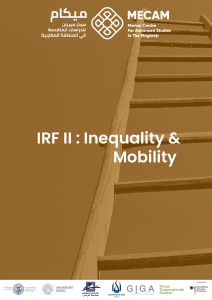
IRF « Inequality & Mobility »
Has a focus on social and economic inequalities, the resulting sense of insecurity, and their role in the (re-)negotiation of visions and models of the future. The IRF specifically explores how distinct forms of disparity (incl. concrete policy decisions) drive or restrain mobility and how in turn, mobility can exacerbate or mitigate inequality;
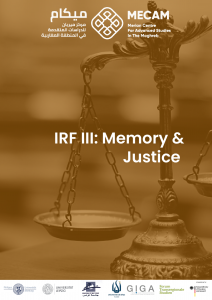
IRF « Memory & Justice »
Discusses legacies of the past, including their legal, political and cultural perceptions and frames in relation to different assessments of the present and to models and (re-)negotiations of the future. Research sheds light on the ways in which differential access to political power shapes questions of accountability, fact-finding, amnesty, judicial reforms, human rights claims and the legitimate sources of law in post-conflict societies and beyond;
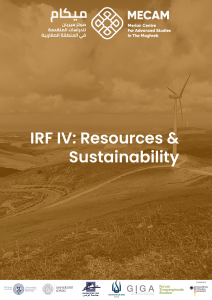
IRF « Resources & Sustainability »
Investigates how societies in general and political decision-makers in particular deal with burgeoning socio-economic disparities and growing environmental problems. This IRF studies which economic models might ensure a politically, socially and ecologically sustainable future. Especially rentier and extractivist economic models in the Maghreb/Middle East are addressed here as these models generate particular forms of disparities and thus also interesting visions of the future.
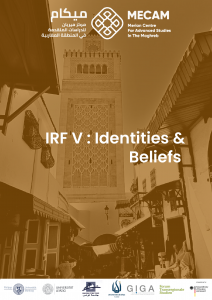
IRF « Identities & Beliefs »
Examines co-existing, sometimes competing identities and belief systems which are partly impacted by political power dynamics. Disparities are felt, perceived and articulated very differently from the vantage point of diverse identities and beliefs, resulting in pluralistic ways of (re-)negotiating imaginations and models of the future. Possible research foci are therefore on topics such as reform-oriented Arab-Muslim thought, the future manifestation of political Islam in the Maghreb but also various of non-religious identities and belief systems.

